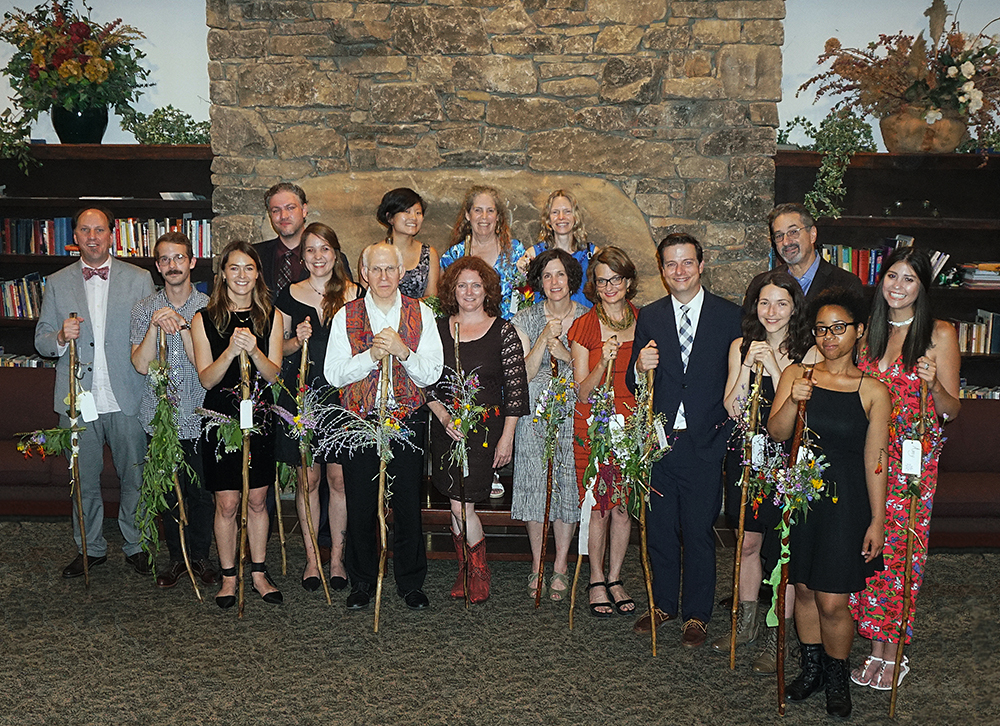Graduates discuss their experiences in the oldest low-residency program of its kind
 For many students in the MFA Program for Writers at Warren Wilson College, graduating is bittersweet. Earning a degree may be the goal, but the process and the bonds they form with their fellow students and professors are the ultimate rewards. On Friday, July 14, 2017, 17 students received master of fine arts degrees in creative writing with concentrations in either poetry or fiction.
For many students in the MFA Program for Writers at Warren Wilson College, graduating is bittersweet. Earning a degree may be the goal, but the process and the bonds they form with their fellow students and professors are the ultimate rewards. On Friday, July 14, 2017, 17 students received master of fine arts degrees in creative writing with concentrations in either poetry or fiction.
The MFA Program for Writers at Warren Wilson College is the oldest low-residency degree program of its kind. Founder Ellen Bryant Voigt, who chairs the academic board to this day, invented the model and launched the program in 1976. After 41 years, she says the key to its success is the focus “on the quality of the work and preparing students to have a life of writing.” The summer class of 2017 embodies her remarks.
“The people and the place are what, for me, define my time at Warren Wilson,” said David Saltzman, a former attorney and 2017 summer graduate in fiction. “The experience of being here—with these writers, on this campus—can’t be separated in any meaningful way from the [writing] craft gains that you have during the semester.”
Peter Schireson, who self-identifies as the program’s oldest recent graduate at 71, wasn’t searching for another degree. After retiring from a successful career in marketing, he started writing poetry. A suggestion from a Warren Wilson College graduate put him on track to earn an MFA.
“I just wanted to focus on my writing and make it better,” said Schireson, who has a doctorate in education from Harvard University. “My writing is better now because it’s clear to me that my standards are higher. I now have tools and the understanding of the elements of the poetic craft.”
The program can point to faculty members and alumni who have won the most prestigious writing awards in the world, but accolades are not its focus. While enrolled in the program, everyone is on the same playing field. That approach seems to attract people who are already incredibly accomplished.
Laura Otis is a tenured professor at Emory University. In 2000, she won a MacArthur Foundation Fellowship. At the time, the foundation acknowledged her creation of “a new analytic approach” through the relationships between “scientific advances and literature.” On Friday, she was one of the newly minted MFA Program for Writers alumni.
“I started teaching fulltime in ’91, but I’ve always wanted to write,” said Otis, who has a Ph.D. in Comparative Literature from Cornell University. “My student convinced me to do this program because it was becoming clearer and clearer that writing a novel was something I had to do.”
In the low-residency format, each semester is initiated with a 10-day session on campus of lectures, classes, workshops, seminars and conferences. Students then work one-on-one with faculty mentors, exchanging packets of their creative and critical writing, for the remainder of the five-month semester.
“The low-residency format is terrific. They’ve been doing this for a while, and they know what they’re doing. But, it’s a lot of work. They tell you in the beginning that if you can’t put 20 to 25 hours into this per week, it’s not going to go so well for you. That’s true. I have worked hard. You’ve got to have some passion for it,” said Schireson.
It becomes clear that each student is searching for a place to connect with like-minded people. Schireson calls his fellow writers in the MFA Program members of his “tribe.” Otis says it is an honor to belong to this group. Saltzman takes it a step further.
“Most of my best friends in the world, I met here,” Saltzman said. “And if you want to live a life that revolves around writing in the way that this program gives rise to organically, it can take a long time, and the odds of success are very low. But here, it doesn’t feel that unlikely. I found my people. So the losses I’ll feel most keenly after graduation stem from what a privilege and joy it has been, being part of this community. It’s the best place I’ve ever known.”
Schireson said Warren Wilson College’s program has remained successful because of “clarity of focus” and the “quality of people.” Above all, he believes the culture within the MFA Program for Writers is the true measure of success.
“It’s toughminded and good hearted. Those two things in combination are very potent. It’s supportive and not just happy talk. It’s substantively supportive,” Schireson added.
Otis said she now has affirmation that her writing has value.
“To be accepted into a program of this caliber inspires me to write. I look at my writing as if I am good enough for them, then what I am doing must have value,” Otis concluded.
In addition to Otis, Saltzman and Schireson, the class of 2017 includes Mark Elber, Esme Franklin, Sarah Gauch, Amy Lin, Leigh Lucas, Trish Marshall, Micah Matthews, Amanda Newell, Tiana Nobile, Andrew Peterson, Maya Phillips, Blake Reemtsma, Susan Jo Russell and Nomi Stone.
The summer 2017 graduation keynote speaker was MFA Program for Writers at Warren Wilson College faculty member and poet Alan Shapiro, who is also the Kenan professor of English at the University of North Carolina at Chapel Hill. The ceremony was held in the Ransom Fellowship Hall at Warren Wilson College.
For more information about the MFA Program for Writers at Warren Wilson College, visit wwcmfa.org.